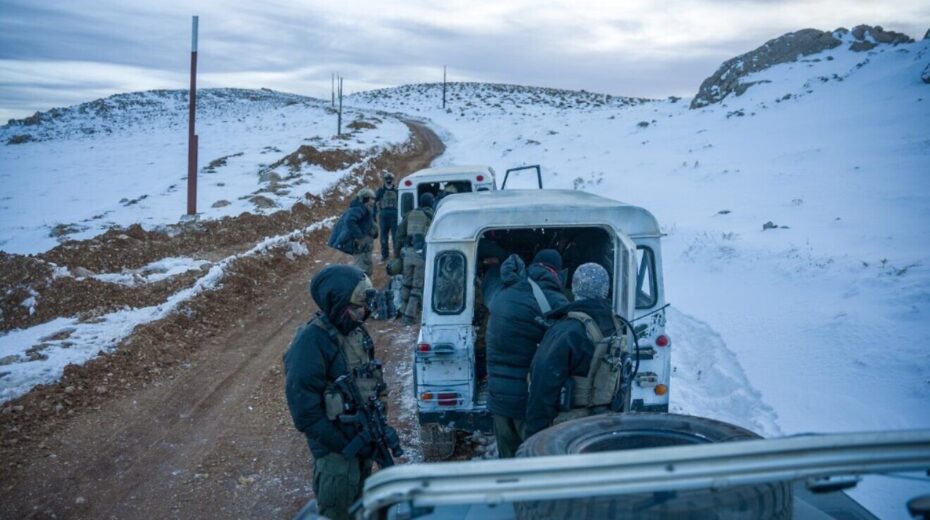Katz orders IDF to create security zone beyond border with Syria
The IAF carried out numerous strikes in Syria overnight Sunday, taking out weaponry that Jerusalem fears could fall into the hands of hostiles.

Troops of the Israeli Air Force's elite Shaldag unit on the Syrian side of Mount Hermon, Dec. 8, 2024.
Israeli Defense Minister Israel Katz has ordered the Israel Defense Forces to create a secure area free of “heavy strategic weapons and terror infrastructure” beyond the buffer zone with Syria, the Defense Ministry said Monday.
Katz said he had instructed the IDF to establish full control over the demilitarized buffer zone in the Golan Heights, which was established by the 1974 Disengagement of Forces Agreement between Damascus and Jerusalem and ended the 1973 Yom Kippur War.
The defense minister also ordered the continued destruction of strategic weapons that were previously held by the regime and Iranian-backed militias to prevent their falling into the hands of terrorist forces. Among these weapons are “surface-to-air missiles, air defense systems, surface-to-surface missiles, cruise missiles, long-range rockets and coast-to-sea missiles,” according to the ministry.
He has also instructed the army to “prevent and thwart the renewal of the arms smuggling route from Iran to Lebanon through Syria, in Syrian territory and at border crossing points.”
Lastly, Katz said he had asked the military to attempt to establish contacts with Syria’s Druze community and other local populations.
Former Syrian President Bashar Assad fled Damascus on Sunday after rebel groups stormed the capital, ending his family’s five-decade rule.
“The tyrant Bashar Assad has been overthrown,” a rebel spokesperson declared in a statement carried on state television on Sunday morning.
Following the events in Syria, the IDF was deployed to the buffer zone and “several other places necessary for its defense.” The army said the move, which followed a situational assessment, was taken to “ensure the safety of the communities of the Golan Heights and the citizens of Israel.”
Intelligence chiefs have warned that the collapse of the regime has the potential to create turmoil in which threats against Israel could develop.
The IDF said late on Sunday night that it was continuing to operate along the new border line with Syria, “focusing on intelligence gathering and defending the residents of Israel, particularly the Golan Heights.” The Syrian side of Mount Hermon was captured on Sunday by Israeli special forces, who reportedly did not encounter any resistance during the operation.
Israeli forces were also said to have been working to accelerate the construction of a fortified barrier along the border between the two countries, dubbed “New East.”
Meanwhile, two “Middle Eastern security sources” told Reuters that the IDF had targeted a research facility in Damascus believed to have been used by Iran to develop long-range guided missiles.
The IAF carried out numerous strikes in Syria overnight Sunday, taking out weaponry that Jerusalem fears could fall into the hands of hostiles. The strikes have reportedly targeted arms storage facilities, air defense systems and weapons production capabilities.
Israeli Prime Minister Benjamin Netanyahu, visiting the Syrian border on Sunday, hailed the collapse of the Assad regime, “a central link in Iran’s axis of evil,” calling it a “historic day in the history of the Middle East.”
However, he said Israel would first and foremost protect its border. “This area was controlled for nearly 50 years by a buffer zone,” he noted while visiting Mount Bental, a dormant volcano in the Golan Heights.
“I instructed the IDF yesterday to take over the buffer zone and the adjacent control positions. We will not allow any hostile force to establish itself on our borders,” the prime minister said.
Former Israeli lawmaker IDF Lt. Col. (ret.) Anat Berko told JNS on Sunday that while the collapse of Assad’s rule could benefit Israel in the short term, “Syria could become a no man’s land similar to, as I call it, the era of Islamic State and jihadi tourism.” When the Syrian Civil War began, Berko noted, over 70 countries saw citizens travel to Syria to join Islamic State, including Christian converts to Islam and Israeli Arabs.
“I hope the Israelis studied lessons from Oct. 7,” the former Likud Party lawmaker said. “We need to assume that there are tunnels at the Syrian border with Israel and we need to be prepared for that and scrutinize the situation in a very deep way. We are not dealing here with the enemy of our enemy. They are both enemies; the Sunni and Shi’ite hate the Jews.”
Former ambassador Jeremy Issacharoff, who served as the vice director-general of Jerusalem’s Foreign Ministry and headed the Directorate for Multilateral and Strategic Affairs, noted that while there are “elements of danger, lots of uncertainty in terms of what will happen and who will be in control,” Assad’s demise is “an opportunity, given the fact that there are lots of downsides for Israel’s enemies in what’s happening here.”
“The Syrian people are intelligent; they will see that, after so many years of rule by the Assad family, there may be an opportunity to restabilize the state, rebuild institutions and reunify the country; it might be difficult as there are many areas to bring together,” he said.
“We are following closely and being hopeful that a leadership in Syria could emerge that could create more opportunities for Israel,” he added.
At the same time, Jerusalem is “always following what is happening in Syria, we are always concerned regarding how Iran uses Syria to transfer weapons to Hezbollah,” the former Israeli diplomat stressed.
“I think there is a very clear incentive for Syrians today to look for moderate middle ground instead of painting themselves as extreme Islamist Jihadists,” concluded Issacharoff.
No comments:
Post a Comment